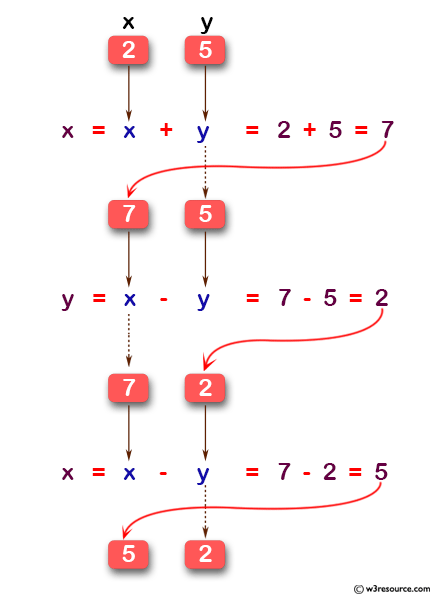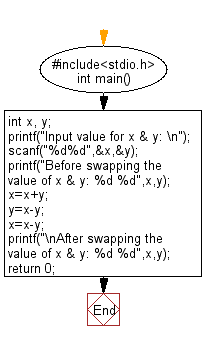C Exercises: Swaps two numbers without using third variable
C Basic Declarations and Expressions: Exercise-55 with Solution
Write a C program that swaps two numbers without using third variable.
Pictorial Presentation:

Sample Solution:
C Code:
#include<stdio.h>
int main()
{
int x, y;
printf("Input value for x & y: \n");
scanf("%d%d",&x,&y);
printf("Before swapping the value of x & y: %d %d",x,y);
x=x+y;
y=x-y;
x=x-y;
printf("\nAfter swapping the value of x & y: %d %d",x,y);
return 0;
}
Sample Output:
Input value for x & y: Before swapping the value of x & y: 5 7 After swapping the value of x & y: 7 5
Flowchart:

C programming Code Editor:
Contribute your code and comments through Disqus.
Previous: Write a C program that accepts a distance in centimeters and prints the corresponding value in inches.
Next: Write a C program to shift given data by two bits to the left.
What is the difficulty level of this exercise?
Test your Programming skills with w3resource's quiz.
C Programming: Tips of the Day
Static variable inside of a function in C
The scope of variable is where the variable name can be seen. Here, x is visible only inside function foo().
The lifetime of a variable is the period over which it exists. If x were defined without the keyword static, the lifetime would be from the entry into foo() to the return from foo(); so it would be re-initialized to 5 on every call.
The keyword static acts to extend the lifetime of a variable to the lifetime of the programme; e.g. initialization occurs once and once only and then the variable retains its value - whatever it has come to be - over all future calls to foo().
Ref : https://bit.ly/3fOq7XP
- New Content published on w3resource:
- HTML-CSS Practical: Exercises, Practice, Solution
- Java Regular Expression: Exercises, Practice, Solution
- Scala Programming Exercises, Practice, Solution
- Python Itertools exercises
- Python Numpy exercises
- Python GeoPy Package exercises
- Python Pandas exercises
- Python nltk exercises
- Python BeautifulSoup exercises
- Form Template
- Composer - PHP Package Manager
- PHPUnit - PHP Testing
- Laravel - PHP Framework
- Angular - JavaScript Framework
- Vue - JavaScript Framework
- Jest - JavaScript Testing Framework
